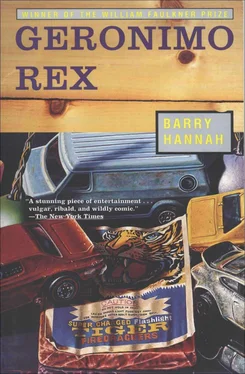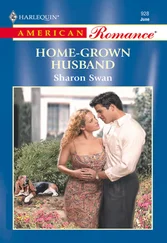Tonight the old man has digressed wildly from his normal dressing habits. Perhaps he has seen Jack Paar with something similar on, or maybe he is trying to prove that age is only making him more of a sport. He wears a blazer of light blue, that is, the blazer is draped over his shoulders and the arms are dangling while his real arms are pressed against his stomach; his shirt is open at the throat and there a kerchief, an Ascot of navy and red splotches, hangs around his neck. On his feet are glistening brown RAF boots. A new cigarette, most likely lit right outside the door, burns neglected in one hand, fine celebrity style. He’s coming on stronger than I ever dared to, and he’s around fifty. There’s my daddy, Butte. I loved the old man at that instant. What guts it took to wear that outfit to Kiwanis meeing. To be president of Kiwanis that year, and show up in his Jack Paar gear; wrap the gavel, standing up with the movie-tone Ascot bursting out of his shirt. They would say he was absurd; the men with the clip-on black ties, they would think he was being struck by an indecent youth-panic in his mellowing years; he would be embarrassing them, those of them that were sure by now if they were sure of anything that ninety per cent of the good life lay in taking age mildly. Or maybe not. Maybe they patted him on the back for his courage and were good envious joes. God knows the crowd my old man ran with at Kiwanis. I never did. But anyway, how many hours had Ode Elann spent in his study worrying about wearing the duds he bought? Un-countable. To him, it must’ve been like coming out in leotards and cape with golden signet letter of his initial on his chest. (I heard later from my mother that this particular night at Kiwanis it was the old man’s duty to introduce and make social with a female journalist speaking to the Kiwanians as guest lecturer. He doted on the photograph she’d sent from her office in Chicago, because she looked hard, passionate, and beautiful. But that picture had been taken in the 1940’s and by the time she got to the Dream of Pines Kiwanis Club, she was a rueful gray hag who quoted the prose of John Dos Passos and did nothing else but drink an amazing amount of coffee and say “Pardon?” to anything anybody asked her. Terrible disappointment for the old man, in his Ascot, and I pity and love him even more for dressing to please that tough big-city gal in the 1940’s photograph.
So the old man has entreed into the kitchen and is hunting for that assurance from Mother and me that his clothes are all right, anyway, and dashing; that we will take him back into the house even as the crazy Riviera cosmopolitan free-liver that he sometimes is. And he sees my mother with an armload of bandages that could just as well be for the personal wounds he has suffered showing up in this outfit for that Chicago journalist woman who so badly failed her photograph.
Then he sees Harley at the sink and notices all the glass mess in the kitchen. Harley is wearing his striped tie and blue shirt, and for a moment there is a question of who is more the wardrobe stud between them. The old man advances his RAF boots a little, and they seem to win hands-down over Harley’s scuffed Marine shoes. Perhaps the old man has never seen Harley in even this much a real suit before, and what a bracing striped necktie Butte is wearing. The old man recedes a little. The edge of his effect has been taken off somewhat by Harley. Resentment and concern cross his face. But what is this? The high-yellow man has his arms in the sink. Harley turns around fully toward the old man, and my father winces at the sight of Butte’s young beard. He doesn’t like it. It doesn’t quite do for a foreman at the mattress factory. It looks like, or makes you think of, some kind of bull nigger who would stick a knife into you for nothing or possess a woman and then break her spine to let her know he was through with her.
Either that, or a completely harmless and ascetic musician, and the old man doesn’t know anything about that. The old man didn’t know that there is no such thing as a physically violent musician; I mean a musician really convinced of his own music.
“What’s going on?” he cries at last, like somebody was setting fire to his house.
“I wasn’t watching what I was doing and got myself cut,” says Harley. I feel that Harley knows his presence, and mainly his beard, is not wanted around here and he is trying to leave the house, in a business-like way as possible. Whatever he wants to tell the old man has been spoiled.
My mother wants Harley to get to the doctor and I offer to drive him. She has wrapped his left arm in a huge, beehive-like glob of gauze and no blood is showing. Harley tells me to drive his car. The new electro-rubber smell is still in it. We whip out.
“Not to the doctor. I ran cold water on it and it’s closed up. I ain’t bleeding any more,” said Harley.
I told him I was worried about infection and he told me not to worry about that; he knew our house and everything in it was clean. He said he knew Betty Perry, our colored maid, who cleaned our house. She was an ex-nurse from a hospital in Dallas; that I didn’t know. Betty had never said anything about being a nurse.
“Same old story,” chuckled Harley. “She fell in love and followed a man to this town. Turn on the radio. I want to get back to what we were talking about.”
I did, and we got some patter from a Shreveport disk jockey; he was raving about the sound about to come up. It happened to be Mose Allison, a white fellow from Tippo, Mississippi, who sings more like a Negro than any non-Negro on the planet: “Gonna find me some kinna worldly companion, eben if she dum, deafm, cripple, and blind!” Mose ended it. I thought Mose was extremely fine. I wanted to be Mose, as a matter of fact.
“Cut it off,” Harley ordered. “You see, here’s some nigguh that just wants and wants, and yearns . He thinks it’s something special to sit on his butt and just yearn after things. Okay, give him … give him … (this was a mild crisis for him, since for all he knew I was still a firecracker-throwing thug) give him Marelynn Monroe and, he’s still gonna find time to plug in his electrocuting guitar and make up gripings about how it’s not so fortunate as he thought— yearning again.”
“But that’s the nature of the blues, Harley. Anyway, that song we heard was sung by a white man making out to be colored. His name is Mose Allison.”
Butte couldn’t get over this. Some white man making out to be colored. Some man granted the same racial strain and cultural heritage as John Philip Sousa, and then … Butte sighed and told me he thought that made it twice as dismal. I had heard of the supposed snobbery of this high-yellow brand of fellow toward the regular blacks. I couldn’t tell if this snobbery worked in Butte or that he’d come by this love of Sousa independent and honest.
“A good march doesn’t leave you yearning like that. Say Sousa. He starts out at some place and takes you to another place and sets you down. You ain’t yearning after anything when a Sousa march is over. You’re there and you’re happy to be there. Then the punch-note on the climax — sometimes, not all the time — like ‘Amen!’, like putting a roof over the place you’re at.”
I heard a band hitting the punch-note and understood what Harley meant. There was great safety in the end of a march, I remembered.
“Do you think about this sort of stuff when you’re at the mattress factory?” I wanted to know. Harley turned toward me and I could feel him staring as I drove. We were barreling down one of those avenues with silvery streetlight arms and twelve-foot pines in the front yards. Everyone had his yard trimmed beyond reproach — green carpets, shaggy needles, the lukewarm wind flying by. I had no idea where we were heading.
Читать дальше












